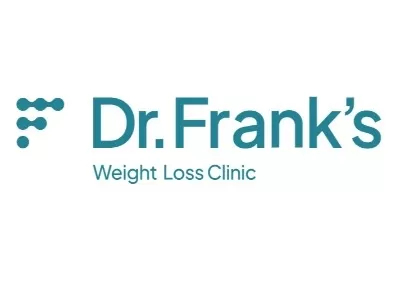Introduction
If you’ve ever stood in front of the mirror wondering why the latest diet left you hungry, exhausted, and right back where you started, you’re not alone. For many people, the traditional formula of counting calories and exercising harder doesn’t work. The truth is, weight loss isn’t just a matter of willpower – it’s a medical condition shaped by complex hormonal signals and biological roadblocks.
And that’s where frustration often sets in. Because when the scales don’t shift, it’s easy to feel as though you’ve failed. Nights end with guilt, mornings begin with promises to “try harder,” and the cycle repeats. Add in the endless noise of diet culture – detox teas, Instagram fads, celebrity regimes – and no wonder so many people feel exhausted before they’ve even begun. The real issue isn’t effort; it’s that biology has been overlooked.
Dr Frank's Weight Loss Clinic was founded to change that conversation. Led by Professor Franklin Joseph, a consultant endocrinologist with decades of experience, the clinic combines advanced medications, such as GLP-1 and GIP agonists, with personalised nurse support, nutritional guidance, and emotional care. It’s about aligning treatment with how the body actually works, so that hunger quiets down, small changes stick, and progress finally feels possible. Whether your goal is losing weight for health, confidence, or to feel like yourself again, the tools and support are here to make that journey sustainable.
So what exactly is Dr Frank's Weight Loss Clinic, and why are more people turning to it as a solution?
What is Dr Franks Weight Loss Clinic?
If you have ever searched for weight loss help late at night, you will know how overwhelming it feels – hundreds of “miracle fixes”, endless diet tips, and a creeping doubt that any of them really work. Dr Frank's Weight Loss Clinic was created to cut through that noise with a medical, regulated, and supportive approach designed for people who are tired of going in circles.
Led by Prof Franklin Joseph, an expert in obesity medicine
-
Professor Franklin Joseph is a consultant endocrinologist with decades of experience treating obesity, diabetes, and hormone-related conditions.
-
He has led clinical trials in the UK and is registered with the General Medical Council, ensuring treatments are medically sound.
-
His vision for Dr Franks is to make proven weight loss medication accessible, paired with human support rather than just “handing over a prescription.”
A personalised, three-pillar philosophy
-
Medication – GLP-1 and GIP-based treatments such as Mounjaro and Wegovy, prescribed safely under clinical supervision.
-
Ongoing support – Specialist nurses provide monthly reviews and wellbeing calls, so you are never left on your own.
-
Nutrition and lifestyle guidance – Bespoke packs developed by the clinic’s dietitian to help patients make sustainable changes.
A CQC-regulated, trusted service
-
The clinic is regulated by the Care Quality Commission (CQC), which means its safety and processes are independently monitored.
-
All clinicians are licensed, and prescriptions are issued only after careful assessment.
-
Patients can access care online or through video consultations, making it convenient for busy lives.
Wrap-Up: In short, Dr Franks is not a fad diet brand – it is a clinically led service built around safe medication, personalised care, and long-term change.
Discover more about Professor Franklin Joseph and the clinic’s medical approach to see if it aligns with your goals.
The Science Behind Weight Loss and Hormones
When most people think about weight loss, the first instinct is to blame calories in versus calories out. But anyone who has tried dieting more than once knows the story is more complicated. Hormones play a central role in appetite, metabolism, and even how your body stores fat – which is exactly why medications like Mounjaro and Wegovy are so effective.
Why calories aren’t the whole picture
-
Hormones such as insulin, ghrelin, leptin, and GLP-1 all influence hunger, fullness, and how efficiently calories are burned.
-
This explains why some people feel constantly hungry even on a strict diet – it is not weakness, it is biology.
-
Real-world example: ever noticed how you crave biscuits after a poor night’s sleep? That is elevated ghrelin at work.
How GLP-1 medications change the conversation
-
GLP-1 (glucagon-like peptide-1) helps regulate blood sugar and slows down stomach emptying, leading to prolonged fullness.
-
Medications like Wegovy mimic this hormone, reducing what many patients call “food noise” – the mental chatter about snacks and cravings.
-
Mounjaro goes one step further by also targeting GIP (glucose-dependent insulinotropic polypeptide), which enhances its effect on both weight and blood sugar control.
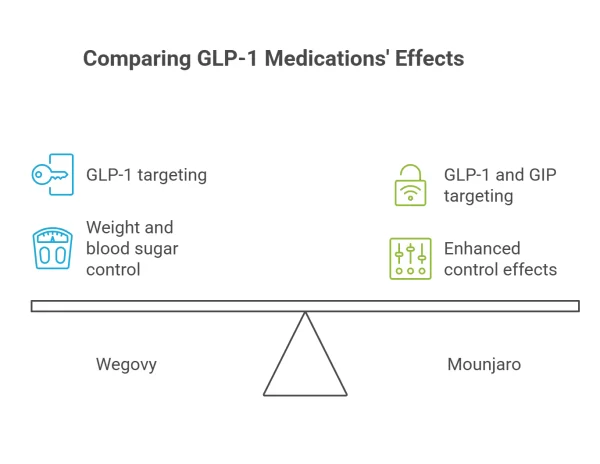
Evidence that goes beyond willpower
-
Clinical trials show Wegovy users lost around 15% of body weight over 68 weeks, while Mounjaro achieved up to 22.5% reductions.
-
These results are not about willpower alone – they are about aligning treatment with the body’s own chemistry.
-
For many patients, this creates the breathing space to make lifestyle changes that actually stick.
Wrap-Up: Understanding the science removes stigma. It is not just about eating less – it is about correcting the hormonal signals that keep your body stuck at the same weight.
Explore how GLP-1 treatments at Dr Franks could support your own biology rather than fight against it.
Understanding the Medications (GLP-1 and GIP)
Once you know hormones are central to weight management, the next question is obvious: how do the medications actually work? At Dr Frank's, three main options are prescribed – Mounjaro, Wegovy, and Rybelsus – all targeting those hunger and satiety pathways in slightly different ways.
Mounjaro (Tirzepatide): dual-action effectiveness
-
Combines GLP-1 and GIP receptor activation for greater impact on blood sugar control and appetite.
-
Clinical trials showed up to 22.5% body weight loss – one of the highest seen to date.
-
Delivered as a once-weekly injection, designed for patients with a BMI over 30, or over 27 with weight-related conditions.
Wegovy (Semaglutide): appetite control and satiety
-
A GLP-1 receptor agonist that slows digestion and reduces hunger signals.
-
Patients typically lose around 15% of body weight when combined with lifestyle changes.
-
Taken as a once-weekly injection, with doses increased gradually to reduce side effects.
Rybelsus: the tablet alternative
-
Oral semaglutide offers similar benefits without the need for injections.
-
Suitable for those who feel anxious about needles but want the benefits of GLP-1 therapy.
-
Taken daily, with specific instructions to maximise absorption.
Safety and regulation you can trust
-
All prescriptions are based on individual assessments by licensed clinicians.
-
Treatments are CQC-regulated, ensuring strict oversight and patient safety.
-
Unlike online “quick fixes,” medication is never shipped without a full medical review.
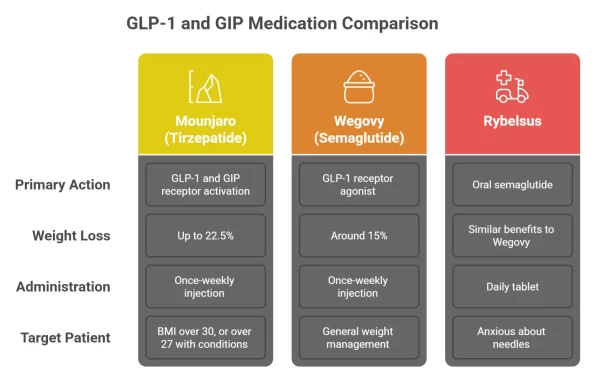
Wrap-Up: Each medication has its strengths, but all work on the same principle – calming hunger signals, supporting blood sugar control, and providing patients with space to create sustainable change.
Learn more about choosing between Mounjaro, Wegovy, or Rybelsus with a consultation at Dr Franks.
Beyond Medication: The Support System
Medication can alter biology, but fundamental transformation often comes from the support surrounding it. At Dr Frank's, treatment isn’t just about prescribing – it is about making sure you feel guided, encouraged, and never left to figure things out alone.
Specialist nurse clinics and wellbeing calls
-
Patients are reviewed monthly by specialist nurses to monitor progress and adjust treatment if needed.
-
Unlimited wellbeing calls are available so that you can reach out on tough days – whether it is managing side effects or celebrating wins.
-
Many patients describe these calls as the difference between feeling “on a plan” and feeling genuinely cared for.
Nutrition and exercise packs tailored to you
-
Custom packs, designed by a clinic dietitian, provide clear guidance on meals and activities.
-
They are not about restrictive diets but about creating habits you can maintain long after treatment.
-
Think minor, practical tweaks – like swapping a mid-morning pastry for protein-rich yoghurt – that add up over time.
Extra services for a fuller approach
-
Options include one-to-one dietitian consultations, health coaching, and even curated meal delivery.
-
The goal is to support both the medical and lifestyle aspects of weight loss, recognising that both matter equally.
Wrap-Up: With structured nurse reviews, accessible support, and lifestyle guidance, the programme becomes less about “just medication” and more about building long-term confidence and change.
Discover how Dr Franks' support packages make treatment personal and sustainable for every patient.
Life on Treatment: What Day-to-Day Looks Like
Starting a medical weight loss programme can feel daunting, not because of the science, but because of the everyday realities – the fridge you open at 9 pm, the office lunch, the Friday night curry with friends. At Dr Frank's, patients often say the real turning point wasn’t the prescription itself, but learning how it fit into their daily rhythm.
The first month: adjusting to changes
-
Side effects such as nausea or reduced appetite are most common in the early weeks.
-
Nurses guide you through dose adjustments, hydration tips, and strategies for managing smaller portions without feeling deprived.
-
A checklist for the first month helps keep things structured, reducing the guesswork.
Eating out and social occasions
-
Patients often notice that they naturally order smaller portions – sometimes half a main dish feels like plenty.
-
Navigating comments like “Is that all you’re having?” becomes easier with the clinic’s coaching advice.
-
Alcohol tolerance may change, so moderation is usually advised.
Celebrating milestones beyond the scales
-
Clothes fitting differently, walking upstairs without pausing, or simply waking up with more energy are celebrated as much as the numbers.
-
Patients are encouraged to track “non-scale victories” as a reminder that progress is multi-layered.
-
Many describe a quiet pride in these everyday wins – like carrying shopping bags up the drive without stopping for breath.

Wrap-Up: Daily life on treatment is not about restriction; it’s about rediscovering balance. The medication makes change possible, and the support helps make it sustainable.
Mental Health and Emotional Wellbeing
Weight loss isn’t just about the body – it’s tangled up with self-esteem, identity, and the way food has comforted or controlled parts of our lives for years. Many patients at Dr Frank's find that once the “food noise” quiets down, emotions they hadn’t expected begin to surface. That’s why mental health support is threaded through the programme.
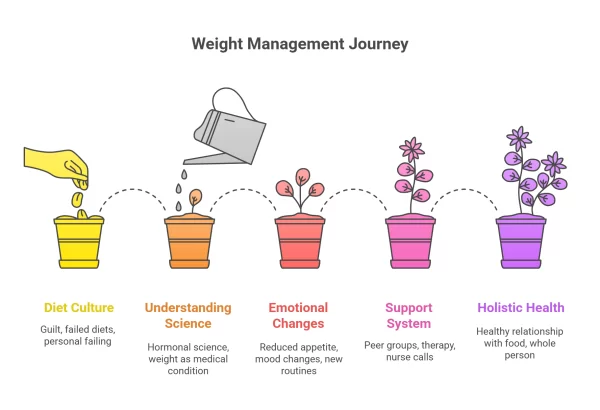
Unlearning years of diet culture
-
Patients often carry guilt from years of “failed” diets, assuming it was a lack of willpower.
-
Understanding the hormonal science behind obesity helps lift that blame, reframing weight as a medical condition, not a personal failing.
-
This mindset shift can help ease anxiety and foster a healthier relationship with food.
Emotional changes during treatment
-
A reduced appetite can spark unexpected feelings – from relief to grief over lost routines (like Friday night takeaways).
-
Some notice mood changes, often tied to improved energy and reduced blood sugar spikes.
-
The clinic team normalises these experiences, offering strategies to navigate the transition.
Support beyond the prescription
-
Patients are signposted to additional resources, from peer support groups to therapy referrals when needed.
-
Regular nurse calls provide a safe space to talk about struggles as well as progress.
-
The emphasis is always on treating the whole person, not just the number on the scales.
Wrap-Up: Addressing mental health alongside physical change ensures weight loss feels empowering rather than overwhelming – a journey that strengthens both body and mind.
Explore how Dr Franks integrates emotional well-being into treatment, helping patients build confidence as well as results.
The Role of Food Intolerance Testing
Sometimes, it’s not just how much you eat, but what you eat, that can hinder progress. Food intolerances can trigger inflammation, bloating, or low energy – all of which make weight management harder. At Dr Frank's, testing is offered to uncover these hidden triggers, allowing patients to make more informed choices.

Why intolerances affect weight and wellbeing
-
Reactions to certain foods can lead to digestive discomfort, water retention, and fatigue.
-
Ongoing inflammation may slow metabolism, making weight loss more challenging.
-
Many patients discover that symptoms they thought were “just normal” – like afternoon brain fog or post-meal bloating – are actually linked to specific foods.
How the intolerance test works
-
A simple finger-prick blood sample is taken at home and posted to the lab using a prepaid kit.
-
Results cover over 200 common foods and drinks, ranging from dairy and gluten-free products to fruits and spices.
-
A personalised report highlights trigger foods and suggests practical swaps.
Turning results into everyday changes
-
Dietitian support helps patients interpret findings and adapt meals without feeling restricted.
-
Avoiding just a handful of trigger foods often brings noticeable improvements in energy and digestion.
-
Patients frequently describe the results as a “lightbulb moment” – finally connecting symptoms to specific foods.
Wrap-Up: Food intolerance testing is not about eliminating everything, but about eating smarter and reducing barriers to weight loss.
Find out more about Dr Frank's food intolerance testing and how it can support your weight loss journey.
Supplements Tailored for GLP-1 Users
GLP-1 medications are potent tools, but they can come with side effects like nausea, reduced appetite, or digestive changes. Supplements developed specifically for GLP-1 users at Dr Frank's are designed to make the experience smoother and help protect overall health while weight is lost.
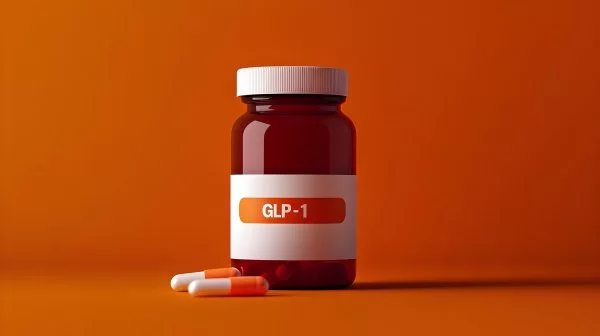
Hydration+ for energy and nausea relief
-
Electrolytes support hydration and help alleviate feelings of dizziness or nausea that some patients experience early on.
-
Many describe it as tasting like a light lemon squash – refreshing enough to sip throughout the day.
-
Proper hydration also helps prevent constipation, another common side effect.
Tri-Magnesium for better sleep and reduced stress
-
Magnesium plays a role in muscle relaxation, nervous system balance, and quality sleep.
-
A tailored magnesium blend can support patients who struggle with restless nights or heightened anxiety during treatment.
-
Improved sleep also stabilises hunger hormones, complementing the medication’s effect.
Protein and collagen for strength and skin support
-
Rapid weight loss can sometimes result in muscle loss; adding protein helps protect lean tissue.
-
Collagen peptides support skin elasticity, which can help reduce sagging or loose skin as weight comes down.
-
Patients often mix protein powders into smoothies or even morning porridge for an easy boost.
Wrap-Up: These supplements aren’t about quick fixes, but about smoothing the journey – supporting energy, sleep, digestion, and confidence as weight shifts.
Explore the Applied x Franks supplement range designed to make GLP-1 treatment more comfortable and sustainable.
Type 2 Diabetes and Dr Franks
For many people living with type 2 diabetes, weight management is not just about confidence – it is about long-term health. Yet access to the proper medication on the NHS can be limited, with strict criteria and ongoing shortages. Dr Franks provides an alternative pathway, helping patients take control sooner.
Everyday struggles with NHS access
-
Medications like Ozempic are often restricted to specific patient groups, leaving others waiting or ineligible for treatment.
-
National shortages have caused frustration, with patients left unsure if their next prescription will even be available.
-
Delays in treatment can mean missed opportunities to improve blood sugar control and reduce health risks.
How Dr Franks supports diabetes patients
-
By offering medications such as Mounjaro, Wegovy, and Rybelsus privately, patients gain consistent access without the need for long waiting lists.
-
Specialist clinicians monitor not just weight loss but also blood sugar levels, tailoring treatment to medical needs.
-
Many patients report improved HbA1c scores alongside steady weight reduction, easing both daily management and long-term risks.
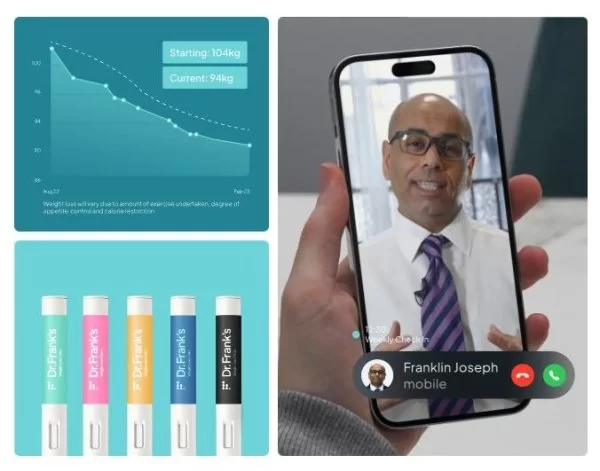
Wrap-Up: For people with type 2 diabetes, Dr Franks offers a medically guided, supportive option that addresses weight and blood sugar together – without the uncertainty of NHS restrictions.
Learn more about type 2 diabetes support at Dr Franks and how treatment can fit into your health goals.
Results, Success Stories and Realistic Expectations
One of the first questions people ask is, “How much weight will I actually lose?” The honest answer is: results vary. At Dr Frank's, outcomes are measured not just in kilograms, but in confidence, energy, and long-term health gains. Patient stories give the clearest picture of what’s possible.
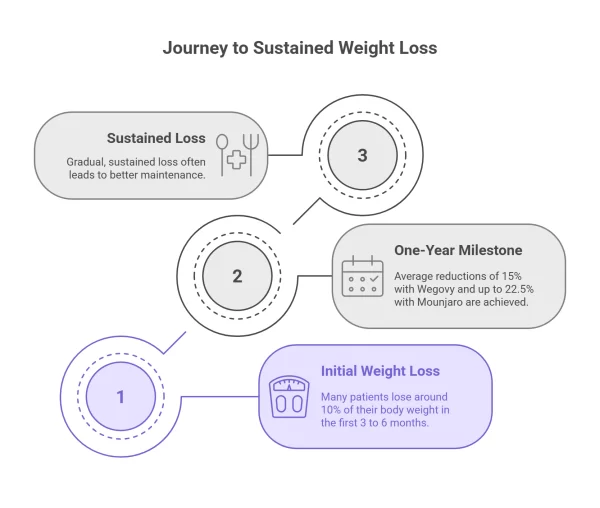
Typical weight loss timelines
-
In the first 3 to 6 months, many patients lose around 10% of their body weight.
-
By the one-year mark, average reductions of 15% are familiar with Wegovy, and up to 22.5% with Mounjaro.
-
The pace may slow after this, but gradual, sustained loss often leads to better maintenance.
Real patient stories
-
Jacqui lost over three stone, describing the moment she could walk into a shop and buy clothes “off the rack” again without worrying about sizes.
-
Ethan, in his early 30s, shed two stone in 4 months, noticing his energy returned enough to play football with friends on weekends.
-
Dimitra, who had struggled for years, said the most significant change wasn’t the number on the scales but “finally feeling in control of food rather than the other way round.”
Managing expectations and setbacks
-
Weight loss is rarely a straight line – plateaus and slower weeks are typical.
-
Side effects or lifestyle changes can create bumps along the way, but ongoing support helps keep progress steady.
-
Patients are encouraged to celebrate “non-scale victories,” such as improved sleep, fitness, and self-esteem.
Wrap-Up: The numbers matter, but the bigger story is how life feels different – lighter, more confident, and more sustainable than crash diets or fads ever could deliver.
See more patient testimonials and results to get a real-world view of Dr Frank's experience.
Community and Support Network
Weight loss can feel isolating if you’re doing it alone – especially when friends or family don’t quite understand why your appetite has changed or why you’re skipping the Friday night takeaway. At Dr Frank's, community is built into the programme so patients know they’re not just supported by clinicians, but also by people walking the same path.

A safe space to share experiences
-
Private groups and forums enable patients to share tips, celebrate successes, and vent on challenging days without judgment.
-
Many describe it as the first time they’ve felt “got” in their weight loss journey.
-
Having peers who understand the realities of GLP-1 treatment helps reduce feelings of isolation.
Access to expert-led sessions
-
Regular webinars and Q&A events with Professor Franklin Joseph and the nursing team provide patients with direct access to expert advice.
-
Topics range from managing side effects to meal planning inspiration.
-
Patients value the opportunity to ask questions in real-time, knowing the answers are medically sound.
Belonging that lasts beyond treatment
-
Community bonds often continue after the programme, with many patients staying connected to encourage one another.
-
That sense of belonging makes it easier to maintain results once the medication ends.
Wrap-Up: The community element at Dr Frank's turns an individual journey into a shared one – building encouragement, accountability, and friendships that last.
Myths and Misconceptions About Medical Weight Loss
Medical weight loss can spark strong opinions – often from people who have never tried it. Patients at Dr Frank's frequently arrive with worries shaped by myths they’ve read online or heard from friends. Addressing these openly helps separate fact from fiction.

"It’s just the easy way out"
-
In reality, obesity is a recognised medical condition, not a character flaw.
-
GLP-1 medications work on powerful hormonal pathways that diets alone can’t fully address.
-
Patients still make lifestyle changes – the medication makes those changes achievable.
"I’ll gain it all back when I stop"
-
Studies show many patients maintain significant weight loss even after treatment ends, especially with ongoing lifestyle support.
-
Dr Franks focuses on habit building, so progress isn’t dependent on medication alone.
-
Ongoing nurse calls and nutrition guidance mean patients leave with tools for the long term.
"These drugs aren’t safe"
-
All treatments are prescribed after thorough medical assessments.
-
Dr Franks is CQC regulated, with licensed clinicians monitoring patients closely.
-
Common side effects (like nausea) are usually temporary and can be managed with guidance.
Wrap-Up: Medical weight loss is not a shortcut – it’s a clinically supported path for people whose biology has resisted traditional methods.
Learn more about how GLP-1 treatments work safely and why they’re changing the future of obesity care.
The Future of Weight Loss Medicine
Obesity care is evolving at a faster pace than ever. What was once limited to restrictive diets and surgery now includes advanced medications, with even more promising therapies on the horizon. At Dr Frank's, staying ahead of these developments is part of ensuring patients have access to the best and safest options.

Beyond GLP-1: new medications in the pipeline
-
Dual and even triple agonist drugs are being developed, targeting multiple hormonal pathways at once.
-
Early trials suggest even greater weight loss potential than current GLP-1 treatments.
-
These next-generation options could also improve heart health, liver function, and diabetes management.
Changing NHS guidelines and access
-
As evidence accumulates, NHS criteria for prescribing weight loss medication may be expanded.
-
Current limitations mean many people don’t qualify, but private clinics like Dr Frank's provide earlier access.
-
Being informed now helps patients prepare for future shifts in eligibility.
The long-term vision of weight care
-
The goal is moving from “short-term dieting” to integrated health management.
-
Weight loss medicine will increasingly be used in conjunction with nutrition, exercise, and psychological support.
-
Clinics like Dr Frank's aim to normalise medical treatment for obesity, reducing stigma and improving outcomes.
Wrap-Up: The future of weight loss is brighter, more science-driven, and more personalised – and Dr Franks is committed to bringing that future to patients today.
Regulation, Pricing and Practical Details
When considering medical weight loss, patients want clarity – not just on how the treatment works, but on safety, costs, and what happens if they change their mind. At Dr Franks, transparency is central, from regulatory oversight to pricing promises.
CQC regulation and safety standards
-
Dr Franks is regulated by the Care Quality Commission (CQC), the same body that monitors NHS services.
-
All clinicians are licensed and undergo regular audits to ensure safe prescribing.
-
This oversight ensures that patients can trust that treatments meet the highest standards of care.
Subscription models and price promise
-
Patients can choose from plans of 1, 3, 6, or 12 months, depending on their needs.
-
The clinic maintains a “price promise” – keeping fees within 10% of the average market rate.
-
Subscriptions include not only medication but also ongoing nurse support and lifestyle resources.
Cancellation and refund policies
-
New patients have a 48-hour cooling-off period for a full refund, unless medication has already been prescribed and dispensed.
-
After this, cancellations incur a small admin fee, and refunds are not available once medication has shipped.
-
If treatment is deemed medically unsuitable or side effects are severe, the clinic may issue refunds on a case-by-case basis.
Wrap-Up: Clear regulations and straightforward pricing make the process as stress-free as possible, allowing patients to focus on results rather than the fine print.
Review the complete pricing and policy details at Dr Franks to understand exactly what’s included before you begin.
Is Dr Franks Right for You?
Every patient’s journey with weight loss is unique. While Dr Franks offers powerful tools and personalised support, it is not a one-size-fits-all solution. Understanding who benefits most – and who may need a different approach – helps set clear expectations.

Who the programme is best for
-
Adults with a BMI over 30, or over 27 with weight-related conditions such as type 2 diabetes or high blood pressure.
-
People who have tried lifestyle changes without lasting success.
-
Patients who value structured medical oversight alongside diet and lifestyle guidance.
Who it may not suit
-
Those looking for overnight results should note that GLP-1 treatments work gradually, not instantly.
-
Individuals are uncomfortable with ongoing medication or injections (though oral alternatives exist).
-
Anyone with medical conditions that contraindicate treatment, determined during assessment.
Alternatives and next steps
-
Some patients may benefit first from GP-led interventions, structured diet plans, or exercise programmes.
-
For others, bariatric surgery remains an option when medication is unsuitable.
-
A consultation with Dr Franks helps determine eligibility and the best path forward.
Wrap-Up: Dr Franks is ideal for patients who want medically led, supported weight loss – but the clinic will always be transparent if it isn’t the right fit.
Take the online eligibility quiz or book a consultation to find out whether Dr Franks is the right step for your weight loss journey.
Conclusion
Lasting change rarely comes from a single product or quick fix. What matters is understanding your body, choosing treatments grounded in science, and having the proper support around you. That’s the thread running through everything we’ve explored here – effective care is never just about the medication or the treatment itself, it’s about the way it’s delivered and the confidence it gives you to move forward.
If there are two things to hold onto, it’s this: weight loss and wellness are deeply personal, and progress feels very different once biology, mindset, and daily habits are working in the same direction. Many patients find that when “food noise” quiets down and small, sustainable changes start to take hold, results stop feeling like a battle and begin to think like momentum.
If you’re curious about whether a medically guided approach is right for you, the safest next step is always a conversation with a qualified professional. Explore trusted resources, ask the questions that matter to you, and remember that the right treatment plan should feel less like a compromise and more like a pathway back to your best self.
